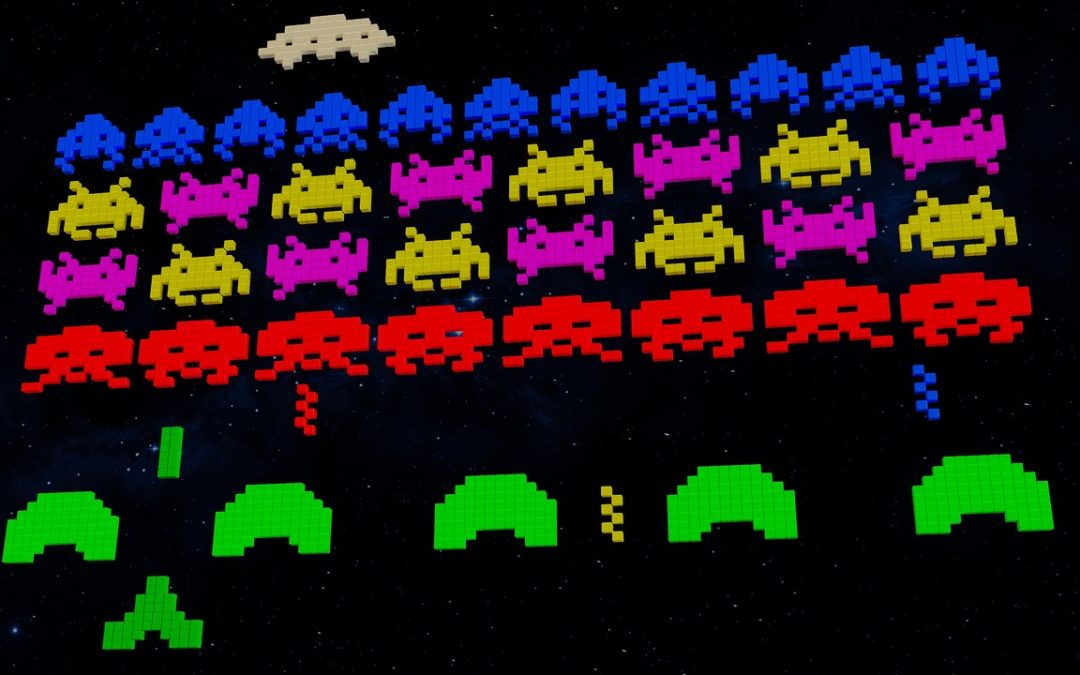Read the detailed description of Quest's Summer Camp information!
How Games Reward the Brain and How to Use This
I recently watched a Ted talk by Tom Chatfield called “7 ways games reward the brain” that I thought made several great points regarding why people are so captivated by video games. I loved this talk since at Quest, we are driven by a concept I like to call play with a purpose where we work to use play and things that are already engaging for kids to help them learn while engaged–I think Chatfield’s talk spoke to much of this idea. I wanted to focus this newsletter on how you could use many of the insights Chatfield draws about your children’s interests and how their brain works to help them learn other important things beyond game play.
| Tom Chatfield’s Key Points: | How to Use Tom Chatfield’s Key Points to Get the Best Outcomes for Your Child: |
| 1. Experience bars measuring progress–video games include one profile for the players that is always growing and progressing so players have a visual of their progress | Kids often do best with clear visuals that show their progress and our focused on how they are progressing forward on their goals. This is especially true for kids with special needs who need more visuals and more positives to see the progress that they are making in certain areas. |
| 2. Multiple long and short-term aims–multiple goals at same time in which the person gets to choose and are often done in parallel | Change and growth is a process and you have time. Think of it as a marathon, not a sprint. Sometimes you will pick what is going to be most pressing and sometimes you might allow your child to focus on a goal for the day or have some combination of the two. |
| 3. Reward for effort–reward every bit of effort and don’t punish failure. He also noted that these rewards are often intense emotional rewards that can be both individual and collective in nature. In regards to rewards, he also noted that rewards are often very frequent in games. Chatfield stated that games are “not too easy or too difficult,” people are always earning something, and “always have a chance to earn something big.” | Reward, reward, reward!!! Kids with special needs often need a minimum of 4Xs more rewards than other kids since they don’t process dopamine as well. Having clear rewards is a critical way to help kids be successful. Kids always need opportunities to earn small and large bonuses. Also, don’t underestimate how special earned time with you is. This could be earned time reading a book together or playing a game together. There is also something truly special when you give a child a bonus they were not expecting when you acknowledge something positive you notice that they did. |
| 4. Rapid, frequent, clear feedback | This is critical! There is a reason that at Quest we give our kids clear feedback about their individualized goals every hour of our program. We also recommend that for our parents’ home goals that they give feedback every day as well since otherwise kid’s don’t connect the dots as well as to how their behavior (both expected and unexpected) leads to different outcomes for them. |
| 5. An element of uncertainty–Chatfield labeled this a “neurological goldmine” from having “an uncertain reward” that “lights the brain up” to transform the level of engagement for reward seeking behavior since this affects dopamine | This goes back to rewards, rewards, rewards! This to me is kind of like how when somebody hits a jackpot once in Vegas and then will keep playing the slots despite the odds in the future because it was so powerful that one time. When you reward your child with an unexpected bonus because you caught them doing a good job at something that they didn’t expect they feel great and will keep doing that behavior more often even when you payout less frequently. You can do this with lots of things like giving a big bonus for things like noticing that he organized his school notebook, she walked away from a sibling once when she could have made a situation worse, he took a deep breath unprompted, etc. |
| 6. Windows of enhanced attention–there are windows when people are more likely to remember and be more confident and engage in positive risk taking behaviors | Catch your moments. At Quest, there is a reason that we build our lessons into games. Kids learn best when they are engaged and having fun. Also, you will find that there are certain times that your child will be more open to conversation. This may only be a few minutes so you might need to be brief and pick your words so you can make your point. I like to tell my parents that for kids with attention issues you will often be like an adult in a Charlie Brown cartoon (“waa waa waa waa”) after about 10 words so be brief and too the point. I have some parents that find that their kids are more talkative in the car so they have been known to take the long way home at times if it is a good conversation. Every child is different, but find those times of enhanced engagement. |
| 7.Other people–will be willing to work with others when need to toward a common goal | When you can build in motivation to work with others truly beautiful things happen. At Quest, not only are we a friendship camp, one of my favorite things to do is to have my kids complete team building initiatives in which it isn’t possible to complete unless they are willing to work together. When we do this our kids learn a lot about themselves and others. Families can also set up opportunities of how they need to work together to be successful. |
UPCOMING PROGRAMMING
School Year Programming
School year therapy groups are ten-week afternoon therapeutic groups that are designed to provide therapy by specifically targeting individualized goals for our campers.
A minimum of one hour includes therapeutic activities that heavily target the development of social skills, emotion regulation, and positive behaviors, while the next hour focuses on further skill development by providing a variety of experiential activities as part of a group to create opportunities to observe the child in a natural setting and intervene to facilitate change. Some quarters provide a special emphasis to improve skills, while other quarters have a more general offering based on the campers’ interests and often include programming in areas such as video game making, drama, art, movie making, etc.
Spring Group Started March 19th (Fullerton)
Summer Programming
Quest’s intensive summer program offers 7 weeks of programming (6 weeks of day camp and 1 week of residential). The summer program includes individualized behavior plans, group therapy, occupational therapy, a social thinking curriculum, mindfulness activities, yoga, soccer, games in the park, and field trips (beach, Boomers, Rockin’ Jump, Discovery Science Center, bowling, etc.) to create a fun and engaging, therapeutic camp experience for children.
Weekly parent meetings are also included. The summer program has been found across multiple studies to significantly reduce hyperactivity, impulsivity, aggression, and inattention, while improving peer relations, family relations, athletic competency, behavioral control and self-esteem. Quest has also been found to improve social awareness, social cognition, social communication, and social problems.
Summer Camp Dates are:
June 25 through August 9th

